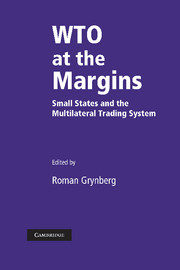Book contents
- Frontmatter
- Contents
- List of figures and appendices
- List of tables
- List of contributors
- Introduction
- Part I Theory and evidence
- 1 A theory of trade and development of small vulnerable states
- 2 Small countries: a survey of the literature
- 3 When comparative advantage doesn't matter: business costs in small economies
- 4 Can small states compete in manufacturing?
- 5 The economics of isolation and distance
- 6 The trade performance of small states
- 7 Small economies and special and differential treatment: strengthening the evidence, countering the fallacies
- Part II WTO and small economies
- Part III WTO dispute settlement
- Part IV Negotiating issues and institutional arrangements
- Index
5 - The economics of isolation and distance
Published online by Cambridge University Press: 05 May 2010
- Frontmatter
- Contents
- List of figures and appendices
- List of tables
- List of contributors
- Introduction
- Part I Theory and evidence
- 1 A theory of trade and development of small vulnerable states
- 2 Small countries: a survey of the literature
- 3 When comparative advantage doesn't matter: business costs in small economies
- 4 Can small states compete in manufacturing?
- 5 The economics of isolation and distance
- 6 The trade performance of small states
- 7 Small economies and special and differential treatment: strengthening the evidence, countering the fallacies
- Part II WTO and small economies
- Part III WTO dispute settlement
- Part IV Negotiating issues and institutional arrangements
- Index
Summary
A recent programme of research at the Centre for Economic Performance at the London School of Economics addresses the role of geography in determining trade flows, the location of economic activity, and the extent of income differentials between countries. Although not directed especially at the problems faced by small or isolated economies, the central issues researched are the interactions between scale and proximity. There are benefits from being large and from being close to centres of economic activity, and the research seeks to understand these benefits, assess their magnitude, and evaluate the rate at which they fall off with distance from the centre. The purpose of this chapter is to draw out some of the implications of this research for small and isolated economies that are deprived of these benefits.
The point of departure is to pose the question, why do isolation and distance matter for economic performance? There are several main considerations. The first is simply that having good access to markets is valuable for firms. The access can derive from two sources: one is proximity to other countries that can bring good access to export markets, and the other is domestic scale, i.e. the extent to which the home market can provide an alternative to exports. Countries that are both remote and small forgo both these sources of market access. The second consideration is access to suppliers of intermediate and capital goods.
- Type
- Chapter
- Information
- WTO at the MarginsSmall States and the Multilateral Trading System, pp. 145 - 163Publisher: Cambridge University PressPrint publication year: 2006
- 5
- Cited by



